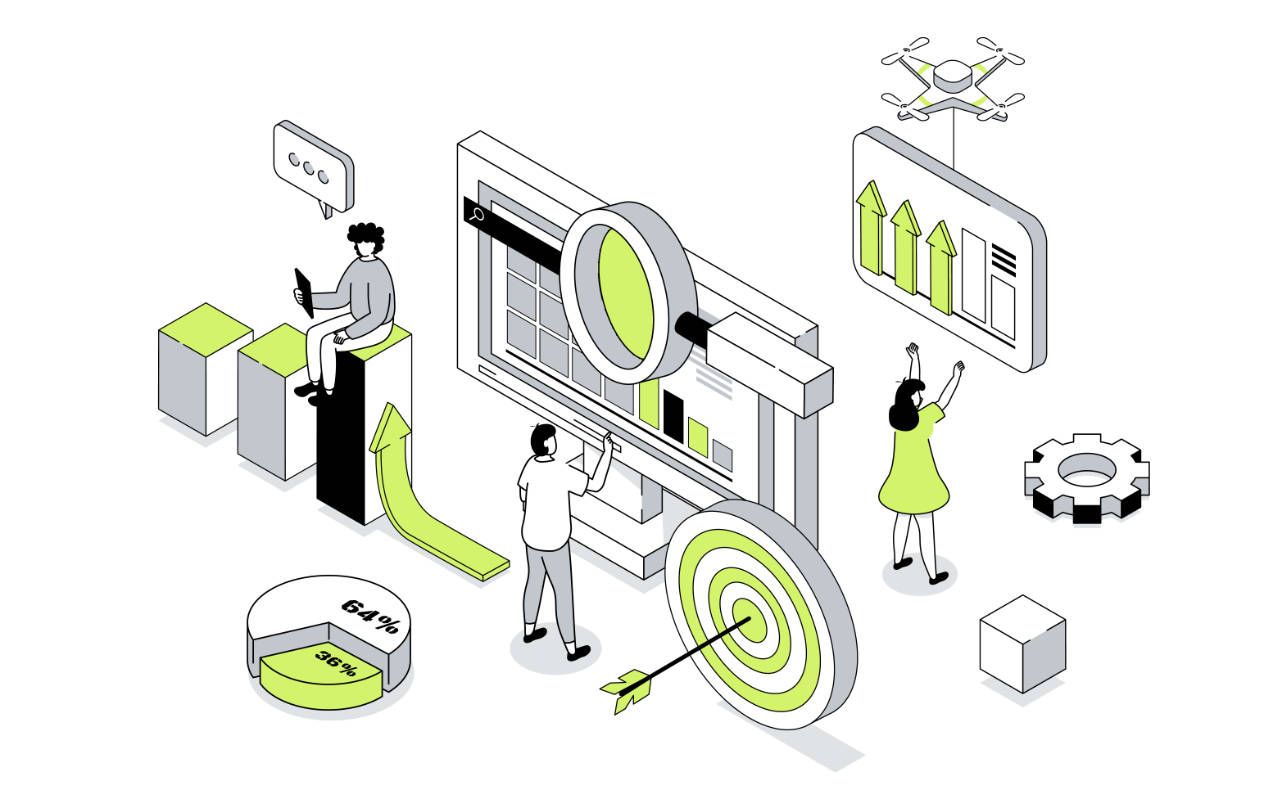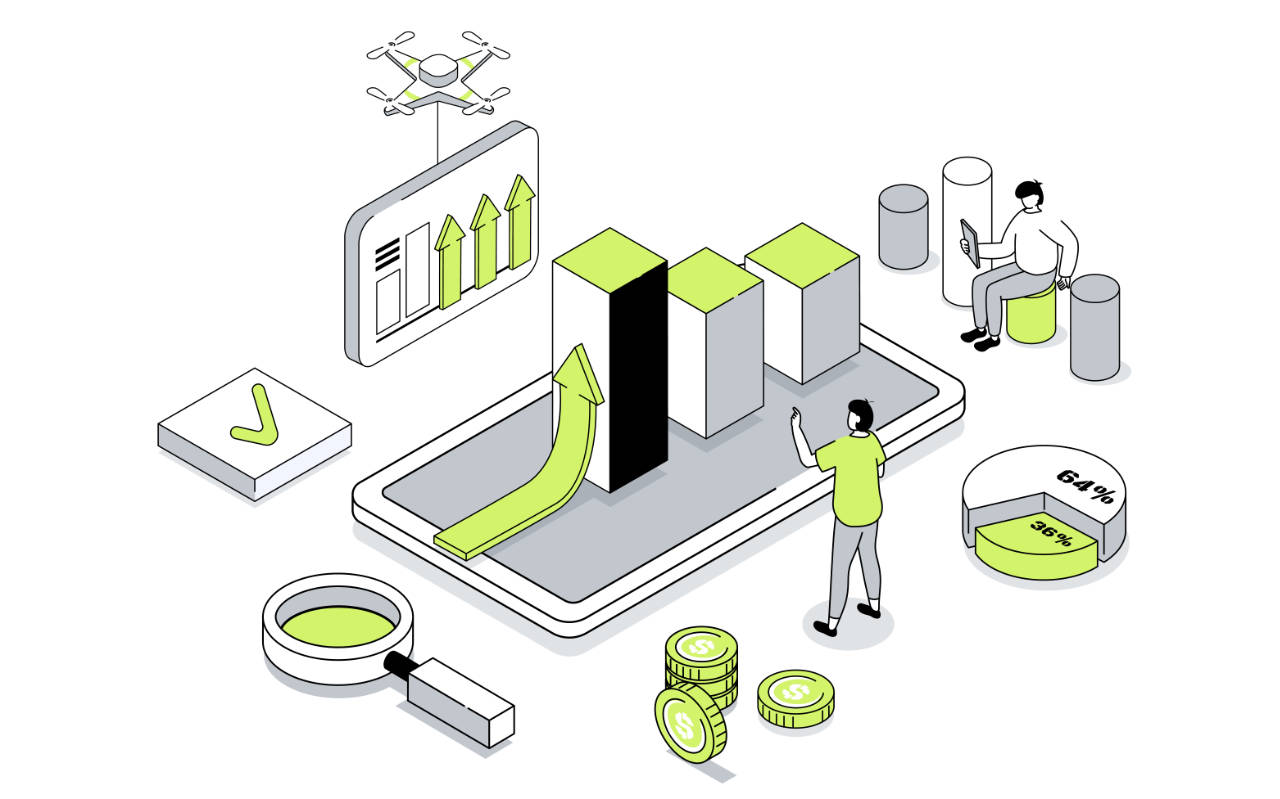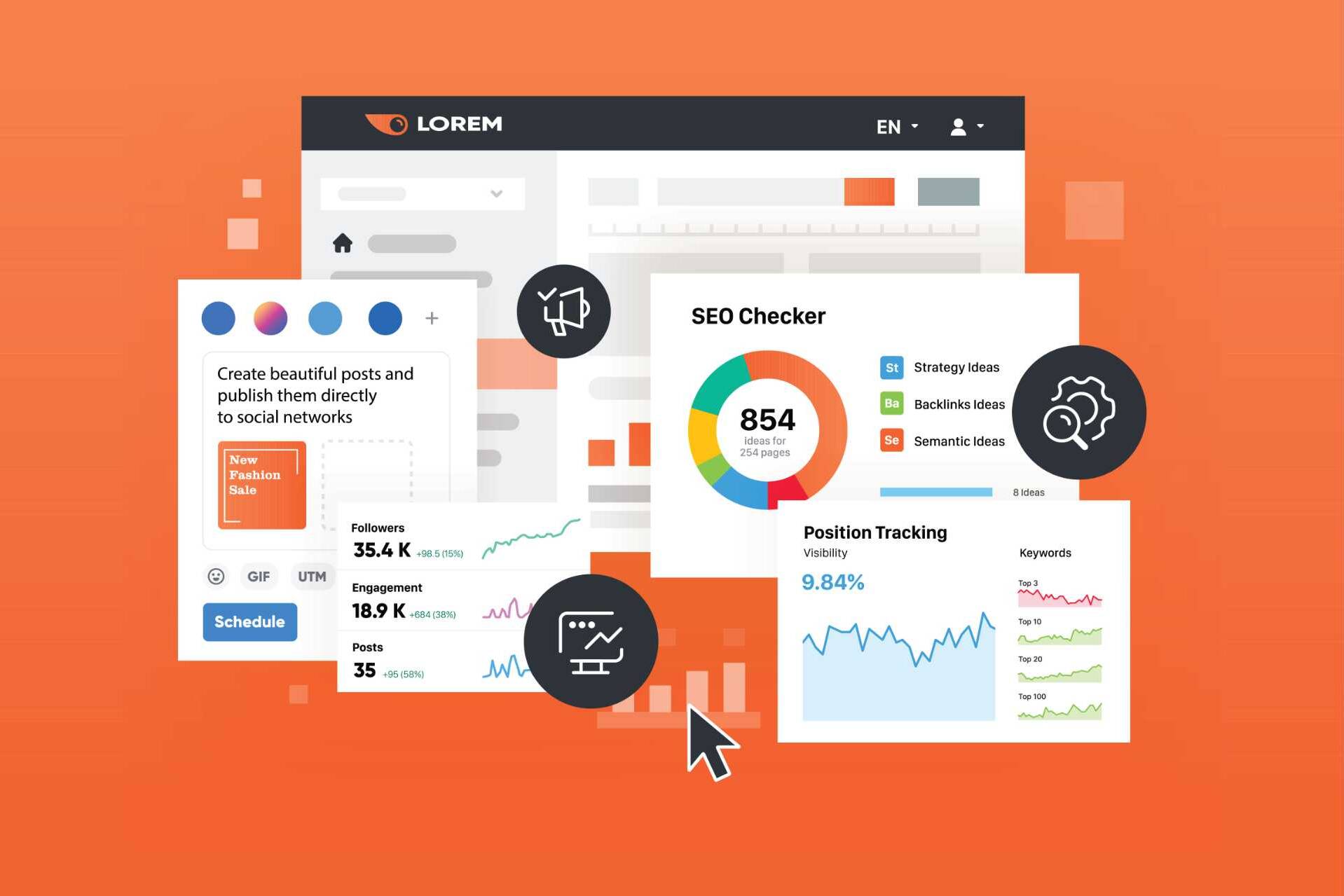Want to understand more about SEO but get confused by SEO terminology and jargon? Elements of SEO can be technical and complex and there can be a lot of terminology to learn. But we’re here to help!
Understanding SEO lingo is important if you want to improve your online presence and incorporating SEO into your digital strategy makes sense for any business. In fact, SEO is now one of the most sought-after digital marketing services as more organisations recognise its value.
Read on as we take the mystery out of the key SEO terminology and terms you’ve been wondering about. We’ll test you later (kidding).
 SEO terminology – 45 SEO terms you need to know
SEO terminology – 45 SEO terms you need to know
Algorithm
An algorithm is a set of rules or a mathematical formula used by search engines like Google to determine the relevance and ranking of web pages in search results. These algorithms are frequently updated to improve search accuracy and user experience.
Alt text
Alt text, or alternative text, is a brief description of an image used in HTML code. It helps search engines understand the content of an image and improves accessibility for users with visual impairments by providing context through screen readers.
Anchor text
Anchor text is the clickable, highlighted text in a hyperlink that directs users to another webpage. It should be descriptive and relevant to the linked page to improve SEO and enhance user experience (UX).
Backlink
A backlink is a link from one website to another, often considered a vote of confidence in the linked site’s content. High-quality backlinks from reputable sites can improve a website’s search engine ranking, as they indicate your page is relevant and trustworthy.
Black hat SEO
Black hat SEO refers to unethical practices used to manipulate search engine rankings, such as keyword stuffing or cloaking. These tactics can lead to penalties from search engines, such as lower rankings or removal from search results.
Bounce rate
Bounce rate is the percentage of visitors who leave a website after viewing only one page. A high bounce rate may indicate that the page content is not engaging or relevant to the user’s search intent.
Canonical URL
A canonical URL is the preferred version of a web page that search engines should index and rank. It helps websites to avoid duplicate content issues by consolidating multiple URL variations into a single, authoritative page.
Click-through rate (CTR)
Click-through rate (CTR) is the ratio of users who click on a specific link to the total number of users who view a page, email or advertisement. A higher CTR indicates that the content is relevant and engaging to users.
Content Management System (CMS)
A Content Management System (CMS) is software that allows users to create, manage and modify content on a website without needing specialised technical knowledge. Popular CMS platforms include WordPress, Joomla and Drupal.
Conversion rate
Conversion rate is the percentage of visitors who complete a desired action on a website, such as making a purchase or filling out a contact form. A higher conversion rate indicates that the website effectively persuades visitors to take action.
Crawling
Crawling is the process by which search engine bots, or “spiders”, browse the internet to discover and index new or updated web pages. Efficient crawling ensures that a website’s content is accessible and visible in search results.
Domain authority (DA)
Domain authority is a metric developed by Moz that predicts a website’s ability to rank on search engine results pages. It is based on factors such as the number and quality of backlinks, and a higher score indicates stronger potential rankings.
Duplicate content
Duplicate content refers to blocks of identical text that appear on multiple web pages, either within a single website or across different sites. It can confuse search engines and negatively impact SEO, as it is unclear to them which version should be ranked.
 Featured snippet
Featured snippet
A featured snippet is a highlighted excerpt from a webpage that appears at the top of Google’s search results, providing a concise answer to a user’s query. Achieving a featured snippet position can increase visibility and traffic for a website.
Google Analytics
Google Analytics is a free tool offered by Google that tracks and reports website traffic. It provides insights into visitor behaviour, helping businesses optimise their online presence and improve their marketing strategies.
Google Business Profile
Google Business Profile is a free tool that allows businesses to manage their online presence across Google, including Search and Maps. It helps businesses attract local customers by providing essential information such as addresses, phone numbers and operating hours.
Google Search Console (GSC)
Google Search Console is a free service offered by Google that helps website owners monitor and maintain their site’s presence in search results. It provides insights into search performance, indexing status and alerts for potential issues.
HTML
HTML, or Hypertext Markup Language, is the standard language used to create and design webpages. It structures content on the web and allows for the inclusion of elements like text, images, and links.
Read more about website terminology.
Hyperlink
A hyperlink is a clickable element on a webpage, typically a piece of text or an image, that directs users to another document or webpage. It plays a crucial role in website navigation and linking related content.
Indexing
Indexing is the process by which search engines organise and store content after crawling. Indexed pages are eligible to appear in search engine results, making it essential for visibility and discoverability.
Internal link
An internal link is a hyperlink that connects one page of a website to another page within the same domain. It helps distribute page authority, improves site navigation and enhances user experience.
 Keyword
Keyword
A keyword is a specific word or phrase that users type into search engines to find relevant content. Identifying and targeting the right keywords can improve a website’s visibility and ranking in search results.
Keyword cannibalisation
Keyword cannibalisation occurs when multiple pages on a website target the same keyword, causing them to compete against each other in search engine rankings. It can dilute SEO efforts and reduce the effectiveness of each page.
Keyword density
Keyword density is the percentage of times a keyword appears in a web page’s content relative to the total word count. Maintaining an optimal keyword density is important to avoid keyword stuffing while staying relevant.
Keyword research
Keyword research involves identifying and analysing search terms that users enter into search engines. It helps businesses understand user intent and optimise their content to improve search engine rankings and reach their target audience.
Learn about how to optimise pages for SEO.
Landing page
A landing page is a standalone web page designed to capture leads or drive conversions. It is often used in marketing campaigns and should be optimised for a specific goal, such as downloading a resource or signing up for a newsletter.
Link building
Link building is the process of acquiring backlinks from other websites to improve a site’s authority and search engine ranking. Quality link building involves creating valuable content that naturally attracts links from reputable sources.
Discover Submerge’s link building services.
Long-tail keyword
A long-tail keyword is a specific, multi-word phrase that is less competitive, but highly relevant, to a particular niche. Targeting long-tail keywords can attract more qualified traffic and improve conversion rates. These are often phrased as questions.
Read about why long-tail keywords are important.
Meta description
A meta description is a brief summary of a webpage’s content, typically displayed beneath the page title in search engine results. An effective meta description can entice users to click on the link, increasing CTR.
Mobile optimisation
Mobile optimisation ensures that a website is user-friendly and performs well on mobile devices. It involves responsive design, fast loading times and easy navigation, adding to a positive user experience.
Nofollow link
A nofollow link is a hyperlink with a rel=”nofollow” attribute, instructing search engines not to pass authority or ranking influence to the linked page. It is often used for paid links or untrusted content.
Off-page SEO
Off-page SEO refers to optimisation activities outside a website that impact its search engine ranking. It includes link building, social media marketing and influencer outreach to enhance a site’s authority and reputation.
On-page SEO
On-page SEO involves optimising individual web pages to improve search engine rankings and drive organic traffic. It includes elements like content quality, keyword usage, meta tags and internal linking.
Learn more about our on-page SEO services, including content optimisation, internal link building and schema markups.
Organic search
Organic search refers to unpaid search results that appear on search engine results pages. Optimising for organic search involves improving a site’s SEO to increase visibility and attract relevant traffic.
Page authority
Page authority is a metric developed by Moz that predicts the likelihood of a specific webpage ranking in search results. It is based on factors like link equity and content quality, with higher scores indicating stronger ranking potential.
Page speed
Page speed is the time it takes for a webpage to load and display all its content. Faster page speeds enhance user experience and are a ranking factor for search engines, influencing a site’s visibility.
Read the ultimate guide to SEO webpage design.
RankBrain
RankBrain is a component of Google’s algorithm that uses machine learning to understand and process search queries. It helps deliver more relevant search results by interpreting the intent behind complex or ambiguous user queries.
Robots.txt
Robots.txt is a file on a website that instructs search engine crawlers on which pages to crawl or avoid. It is used to manage crawler access and prevent indexing of non-essential or sensitive content.
 Schema markup
Schema markup
Schema markup is a type of structured data that helps search engines understand the content of a webpage. It can enhance search results with rich snippets, providing additional information like reviews, ratings or event details.
Search engine results page (SERP)
A search engine results page (SERP) is the page displayed by search engines in response to a user’s query. It includes organic results, paid ads and features like featured snippets or local listings.
Sitemap
A sitemap is a file that lists all the pages of a website, providing search engines with information about the site’s structure and content. It aids in efficient crawling and indexing, improving a site’s visibility in search results.
Title tag
A title tag is an HTML element that specifies the title of a webpage. It appears in search engine results as the clickable headline and at the top of a browser tab. A well-written title tag should be concise, relevant, and include target keywords to improve CTR and visibility.
User experience (UX)
User experience refers to the overall experience and satisfaction a user has when interacting with a website or digital product. Good UX involves intuitive navigation, fast loading times, and mobile responsiveness, all of which can impact SEO by influencing user engagement and reducing bounce rates.
XML sitemap
An XML sitemap is a file that lists a website’s essential pages in XML format, helping search engines discover and index all content effectively. It provides information about each URL, such as the last update and change frequency, enhancing the site’s crawlability.
Zero-click search
Zero-click search refers to a search engine query that is answered directly on the search results page without requiring the user to click through to a website. This often occurs with featured snippets, knowledge panels, and other enhanced search features.
We’re SEO terminology experts!
Find out more about SEO and how we can help – discover Submerge’s expert SEO services, from SEO audits to website migration.
Nicole Percival
Nicole has been in the marketing and PR industries since she graduated university in 2019, but has been at Submerge since 2021. A keen reader and horror fanatic, Nicole has enjoyed writing since she was a small child, and has covered industries including consumer tech, food and beverages, business compliance, education, film and entertainment, and wellbeing.
19/03/2025
10 best Domain Authority checkers
Understand your website's standing with a domain authority…
15/03/2025
Domain Authority – what is it and how do I boost it?
Find out what is domain authority and how it impacts your…
10/03/2025
How to find an SEO expert – the only guide you’ll ever need
Need help with SEO? Find out how to find an SEO expert to…
02/03/2025
What is an SEO strategist – the ultimate guide 2025
Discover what an SEO strategist is and how they can enhance…
31/01/2025
Using the rel=canonical tag – the ultimate guide
Rel=canonical tags are an essential part of every…




